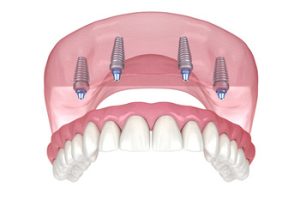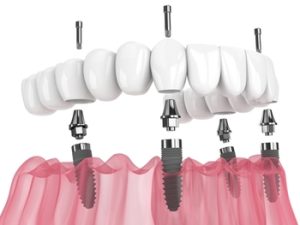Introduction
Full-mouth dental implants are gaining traction in Australia as a sought-after solution for those looking to replace missing or compromised teeth. Unlike conventional dentures, these implants provide:
- A more enduring and practical choice.
- Ensuring aesthetic appeal and easy eating.
- Talking.
- Smiling confidently.
As the interest in this groundbreaking dental intervention swells, grasping the associated costs becomes pivotal for potential clients. The price tag on full-mouth dental implants can fluctuate considerably, hinging on variables like the count of implants needed, the type of materials employed, and the intricacy of the surgery.
This in-depth guide delves into the assorted elements that shape the expense of full-mouth dental implants in Australia. We’ll traverse the myriad benefits and merits and offer a granular view of possible charges, furnishing insights to guide your decision-making about this noteworthy commitment to your dental well-being. Whether you’re toying with the idea of undergoing the procedure or merely keen to understand the expenditure, this manual extends essential knowledge to shepherd you towards a rejuvenated grin.
Why Opt for Full Mouth Dental Implants?
Considering a replacement for damaged or absent teeth is not just about aesthetics; it’s an investment in one’s overall well-being. Full-mouth dental implants have emerged as a leader among available dental treatments, boasting benefits that set them apart from traditional alternatives. Let’s explore why they might be superior to classic dentures.
Key Benefits:
- Endurance & Lifespan: Made from materials like titanium or zirconium, dental implants fuse with the jawbone, ensuring stability. They often outlive dentures, which need frequent replacements.
- Authentic Appearance & Function: Implants replicate the look and feel of real teeth, rejuvenating the smile and normal biting functions.
- Jawbone Retention: Implants play a crucial role in averting jawbone loss, a common consequence of missing teeth, by promoting bone engagement.
- Regular Care: They need the same care as natural teeth – simple brushing, flossing, and regular dental visits.
- Boosted Confidence: A full set of stable teeth enhances self-worth, putting concerns related to gaps or moving dentures to rest.
Dentures vs. Implants:
- Anchorage:
- Ease: Dentures may lead to gum discomfort, but implants offer a seamless experience similar to natural teeth.
- Eating Habits: Denture users often avoid certain foods; implant users face no such limitations.
- Tooth Health: Preparing for dentures might require modifying nearby teeth, while implants allow for more natural tooth conservation.
- Cost Over Time: Initial implant expenses might be steeper, but long-term savings from reduced maintenance can make them more economical in the long run.
Detailed Implant Procedure Overview
A Stepwise Guide to the Implant Journey
Opting for full-mouth dental implants means choosing a holistic approach to regain lost teeth. The journey begins with a dentist’s consultation, where your oral health status is reviewed, and the upcoming procedure is mapped out. Following this, any compromised or rotten teeth are removed. Sometimes, a bone graft might be needed to ensure the jawbone can firmly hold the implants. After allowing several months for healing, a titanium post, serving as the implant, is surgically embedded into the jawbone. As months go by, this implant integrates with the bone in a process known as osseointegration. With this fusion complete, an intermediate piece, the abutment, is fixed to the implant. The final step involves securing the prosthetic tooth or teeth, such as a dental bridge or dentures.
Recovery Insights and What to Anticipate Post-Operation
Post-operation, it’s common for patients to feel slight discomfort, face swelling and notice minimal bleeding. It’s advisable to consume soft foods and keep physical exertion to a minimum for a few days. Pain can be tackled using commonly available painkillers or those recommended by the dentist. Most individuals find themselves back to their regular routines within a week. Yet, the implant’s complete fusion with the bone takes months, making periodic dentist visits essential. With diligent maintenance, dental implants have the potential to serve for a lifetime, standing as a robust and lifelike replacement for lost teeth.
Factors Affecting the Cost of Full Mouth Dental Implants in Australia
The financial aspect of dental implants is subject to several influencing factors. For those in Australia looking to gauge potential costs, the following elements play a pivotal role in shaping the overall expense:
- Number of Implants: Your total outlay will largely depend on the number of implants needed. Naturally, a higher count equates to a steeper price.
- Material Used: The cost can oscillate based on the chosen implant material, titanium or zirconium.
- Complexity of Procedure: The degree of surgical intricacy can vary, influenced by individual dental structures or procedures like bone grafting. This can, in turn, affect the cost.
- Geographical and Economic Factors: Dental implant prices can diverge based on location. Metropolitan areas might have a different fee structure than their rural counterparts, with local economic trends factoring in.
Average Cost of Full Mouth Dental Implants
Getting a clear picture of the average expenditure is crucial for those pondering over full-mouth dental implants. Here’s a condensed summary:
Cost Division:
- Diagnostic Session: Generally covers dental evaluation, X-rays, and formulation of a bespoke treatment strategy. Starting rates are typically around $100.
- Implantation Process: This makes up a significant portion of the overall charges, with starting figures hovering around $15,000, influenced by specifics like procedure intricacy and chosen materials.
- Post-Surgery Management: Encompassing subsequent consultations, medicinal prescriptions, and possible prosthesis adjustments, this might contribute around $1,000.
Additional Costs to Consider
The main pricing for full-mouth dental implants is relatively clear-cut, but there are other potential charges that patients should be mindful of. Here’s an overview:
- Bone Enhancement:
- Tooth Removal: Existing broken or decayed teeth may need removal preceding the implant process, resulting in an extra fee.
- Sedative and Anesthetic Charges: Based on the patient’s comfort and procedure intricacy, there might be costs for varying degrees of sedation or anaesthesia.
- Recovery Essentials: The healing period could require particular medications, oral hygiene items, or wound dressings, each adding more to the final bill.
Options to Fund Your Dental Implants
Understanding Dental Insurance
- Many dental insurance packages might cover some of the costs of implant procedures. Conversing with your insurance provider can shed light on the extent of coverage and any expenses that might fall on you.
Flexible Payment and Finance Options
- Many dental offices offer adaptable payment schemes or collaborate with external finance institutions. Such arrangements can be invaluable in spreading the expenses over a more extended timeframe.
Technological Advancements in Dental Implants
- Many technological innovations have reshaped the realm of dental implants in recent years. A prime example is the integration of 3D imaging and Cone Beam Computed Tomography (CBCT) that produces high-definition, 3D visuals, facilitating dentists’ surgical planning with greater precision. The age-old, often uncomfortable mould-making has been updated, with intraoral scanners stepping in to deliver precise digital impressions, enhancing patient comfort. The incorporation of computer-assisted implant surgeries has brought forth:
- A simulated digital blueprint of the entire dental implant process.
- Enabling dentists to pre-determine the ideal placement and orientation of the implant.
- A considerable dip in associated risks.
Improved Accuracy and Elevated Patient Experience
-
- This wave of technological advancements has accentuated the precision of dental implant placements while uplifting patient experience. Utilising 3D imaging means fewer X-rays, thus reduced radiation. With their associated discomfort, traditional dental moulds are becoming history due to digital impressions. Plus, the consistency rendered by computer-driven surgeries often results in quicker recovery phases and diminished postoperative unease. These strides underscore the fusion of precision with patient care, setting a novel benchmark in dental implants.
Aftercare and Maintenance of Dental Implants
Immediate Aftercare Recommendations
- Post-dental implant surgery, diligent aftercare is of utmost importance. For the initial phase, patients are advised to steer clear of the surgical site to prevent disruptions, which includes avoiding any vigorous rinsing or spitting. To address any swelling during the first-day post-operation, cold compresses can be employed in 20-minute intervals. For pain management, over-the-counter painkillers are generally effective. A diet of soft foods is preferable immediately after the surgery to minimise stress on the new implant. As the healing progresses, one can gradually return to firmer foods.
Guidelines for Long-Term Implant Health
- Consistent professional check-ups and dedicated daily oral care are key for the implant to stand the test of time. Brushing and flossing every day with toothpaste that isn’t abrasive is a must to preserve the implant’s integrity. Biannual dental cleanings and assessments are essential to ensure the implant remains in peak condition and address potential concerns at an early stage. Furthermore, incorporating a water flosser into your oral hygiene routine can prove beneficial, especially for cleaning areas that are tough to reach. Abstaining from certain habits, like biting on solid items such as ice cubes or writing instruments, can also prevent potential damage to the implant.
Addressing Potential Risks in Dental Implants
Risks and Considerations
Dental implant surgery, like any medical procedure, does come with a set of inherent risks. Patients might occasionally experience complications such as infection at the implant site, injury or damage to surrounding structures (like blood vessels or other teeth), nerve damage that might result in pain or numbness, or even sinus problems when implants are placed in the upper jaw protrude into one’s sinus cavities.
Additionally, there’s always the potential, albeit minimal, for the implant not to bond correctly with the bone, leading to failure of the procedure. Understanding these risks is crucial for every patient to make an informed decision.
Risk Mitigation
At our clinic, the health and well-being of our patients are paramount. We pride ourselves on taking exhaustive measures to minimise any associated risks with dental implant procedures. Our expert team of dental surgeons is extensively trained and stays updated with the latest surgical techniques, ensuring a high success rate.
Furthermore, our dedicated follow-up sessions enable us to monitor the implant’s integration process, ensuring any anomalies are detected and addressed promptly. At our clinic, we believe that with proper precautions, technology, and expert handling, the risks associated with dental implants can be efficiently mitigated, ensuring our patients’ smiles remain radiant and trouble-free.
Conclusion
Full-mouth dental implants, though requiring a notable upfront investment, are a gateway to lasting oral health and enhanced overall well-being. Their multifaceted advantages range from restoring functionality to refining aesthetics, highlighting their immense value in the long run. As in every crucial health choice, expert advice is indispensable. At our clinic, our adept professionals stand ready to navigate you seamlessly through the process, prioritising your unique requirements with utmost precision. Your radiant smile, bolstered self-assurance, and overall health warrant nothing less than excellence. Don’t hesitate; take the first step with our Dentist, and embark on a personalised, transformative dental journey. Contact us at (02) 9000 1778 now to schedule your first appointment!
References:
Dental Implants. Part I: Biological basis, implant types, and the peri-implant sulcus https://pubmed.ncbi.nlm.nih.gov/8699485/
Dental implants and how crucial replacing teeth really is https://www.dentalhealth.org/Blog/dental-implants-and-how-crucial-replacing-teeth-really-is












